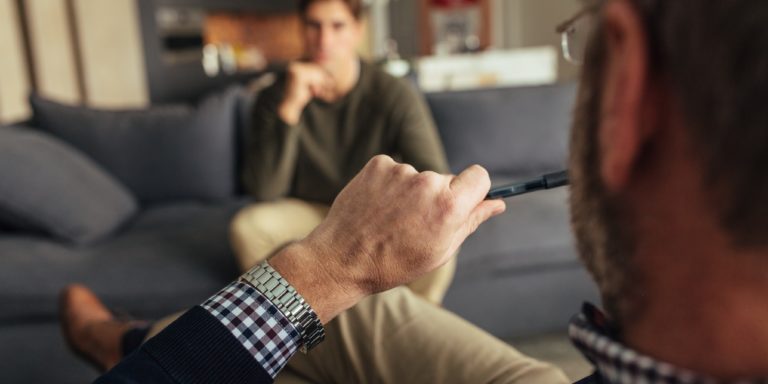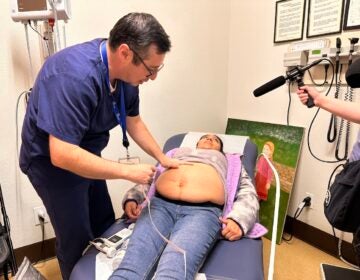Southern Delaware’s Latino community deals with stigma around mental health care plus fewer resources
A generational stigma around talking about mental health care is made worse in southern Delaware, where fewer providers are available.

If a new psychotherapy seems effective, practitioners take it on tour and hope more clinicians will use it. But often, that’s before really knowing how it works, or why. (JacobLund / Big Stock Photo)
Growing up as a “strong-willed” Latina in the United States has been a bittersweet journey for Isana Ventura of 32, who migrated with her family to Sussex County, Delaware, when she was three months old. Her family came to southern Delaware to escape a decades-long civil war in Guatemala. Despite the family’s traumatic arrival, Ventura says it wasn’t always considered acceptable to talk about her mental health needs.
“As Latinos, we’ve been raised to be strong-willed,” she said. “From different conversations that I’ve had with different people, [talking about mental health] is seen as you being weak or maybe not having a strong faith. That’s where seeking mental health therapy and different things like that is kind of frowned upon.”
It’s been a similar struggle for 25-year-old Guatemalan-American Jason Perez who lives in Georgetown in Sussex County. Even though his mother encouraged him to seek therapy at an early age, it felt strange to him.
“I went to therapy as a chore,” Perez said. “I would tell my therapist I’m fine, I’m okay because I didn’t want to be seen as crazy.”
The idea that “it’s okay to not be okay” was something Perez had to discover on his own. Unlike Ventura, Perez also had to cope with the idea that talking about mental health wasn’t “machismo” – another common stigma in Latino culture.
“Not only the Latino community, but other cultures, the man is supposed to be manly, he’s supposed to hide his emotions,” he said. “Even in my family, I’ve been told ‘you’re a man, you’re not supposed to cry or show your emotions’ and I guess that runs from one generation to the other.”
Both Ventura and Perez are working to overcome these generational hurdles, but there are other barriers preventing many others from doing so.
“The Latino culture is very similar to other cultures where there are additional layers of stigma because of some of those cultural beliefs,” said Joshua Thomas, CEO of the Delaware chapter for the National Alliance on Mental Illness. “That can be from the culture saying, ‘we don’t talk about this issue, we don’t talk about mental health,’ or a belief that maybe other things are responsible for people’s behavior.”
That cultural stigma is made worse in southern Delaware, where there’s a large Latino population but fewer mental health care providers and other resources in Kent and Sussex counties.
“The most significant trend or issue that we’re facing right now is access to care and a shortage of mental health providers,” said Stephanie Traynor, deputy director of Division of Prevention and Behavioral Health Services. “The number of providers in New Castle County is higher than Kent and Sussex.”
Part of that reason, according to Traynor, is because New Castle has two large hospitals, Christiana and Nemours, that employ licensed mental health providers, particularly psychologists.
“One of the things that we’ve done to try to increase access is to bring in new providers into our network,” she said. “We brought in eight new providers and then an additional five providers added new services, and we specifically added two providers who are serving Kent and Sussex and they’re providing substance use services.”
Leaders not only are focused on bringing more providers and agencies, but also being receptive to hiring professionals with diverse backgrounds.
“The stigma associated with mental health conditions can have even more barriers and even stronger stigma when there are certain cultural issues that can come into play,” said NAMI CEO Thomas.
Language is one of those issues. “There aren’t many bilingual therapists,” Ventura said. “If there are, they require health insurance or if it’s paid out of pocket, it may be financially a struggle,” said
“We as a culture need to do a better job of multilingual options for helping people understand what mental health condition is and how they can receive help,” Thomas said. “We need to do a better job of attracting multilingual people into the profession, bringing multilingual professionals from outside of the state of Delaware. We need to be able to meet their needs, that is, be culturally aware of what they need in terms of support.”
Accessibility is also a concern for people who work in nursery or poultry plants, since missing a day without pay puts them behind financially.
Investments in Delaware’s mental health infrastructure have long been overdue, and while it is crucial for all age groups, some believe that change begins with the youth.
This week, house majority leader of Delaware, Valarie Longhurst, unveiled a package of six bills to address the youth mental health crisis that includes:
- House Bill 200 would increase the number of mental health professionals in Delaware high schools.
- House Bill 6 would provide funds for school district mental health professionals and district mental health coordinators.
- House Bill 3 would allow students to received three excused absences per school year for mental or behavioral health reasons.
- House Bill 4 would grant students access to support and resources following a school-related traumatic event like a death in the school community.
- House Bill 5 would modify medicaid coverage for mental health services, and allow medically essential behavioral health care without the necessity for an IEP.
- House Bill 7 would encourage mental health facilities to enhance the number of available beds and increase access to inpatient care for children and teenagers in crisis.
Ventura encourages members of the Latino community to take better care of their mental health after seeing her family dynamic improved as a result of her treatment.
“Everything’s like sarcasm and you throw things at each other in a sarcastic way…, it was even hard to hug each other,” she said of her family’s ways. “It’s completely changing our dynamic, like the way we treat each other. We’re able to say I love you to each other, or even give each other hugs.”
WHYY is your source for fact-based, in-depth journalism and information. As a nonprofit organization, we rely on financial support from readers like you. Please give today.






